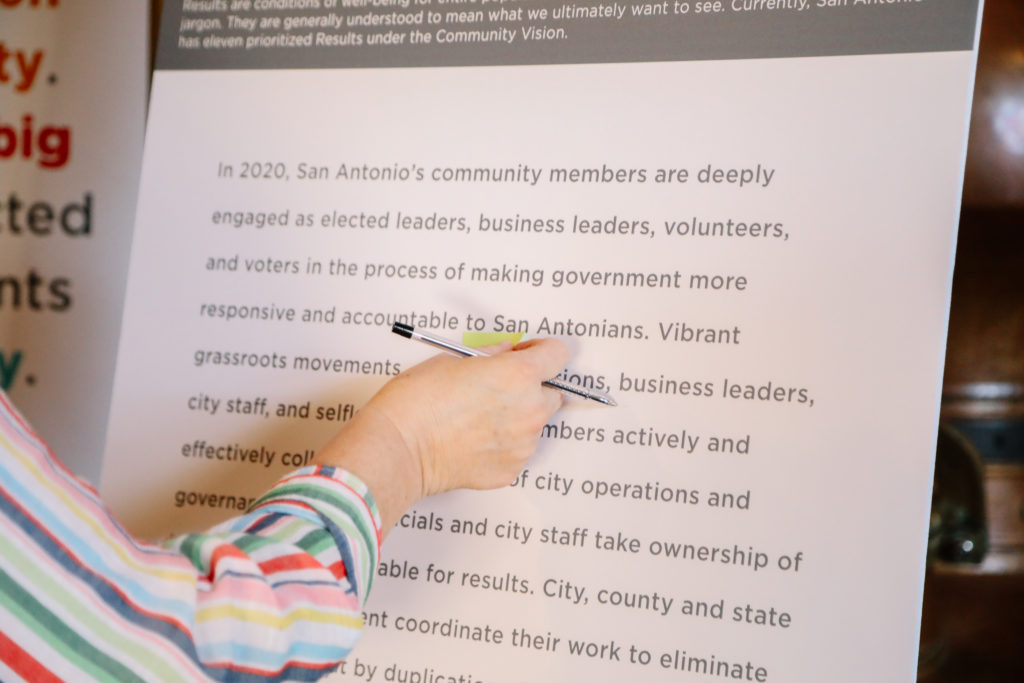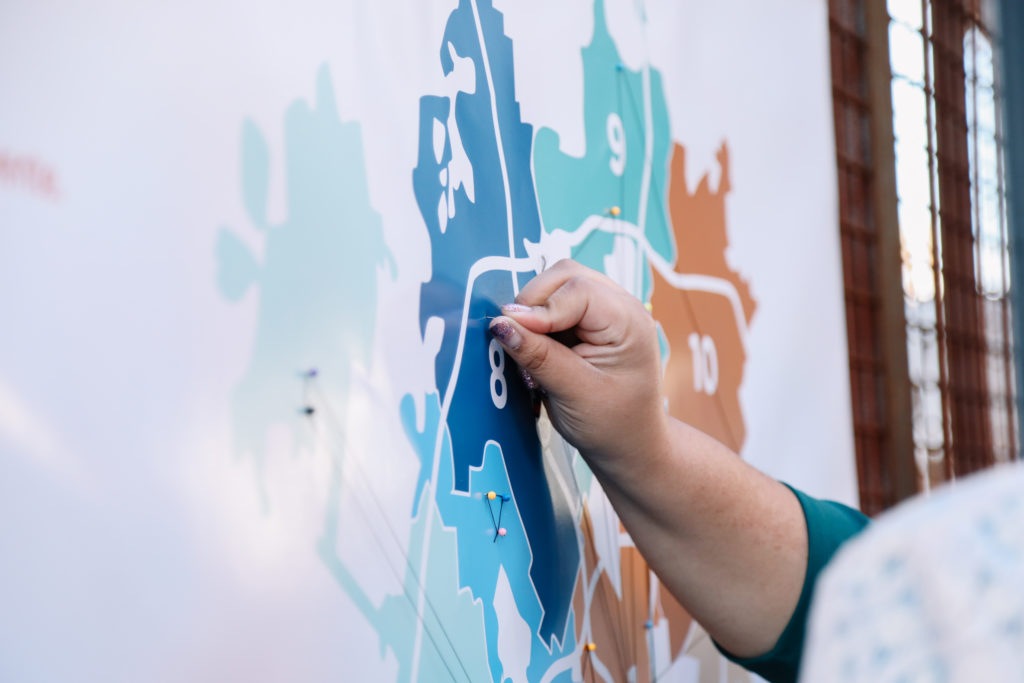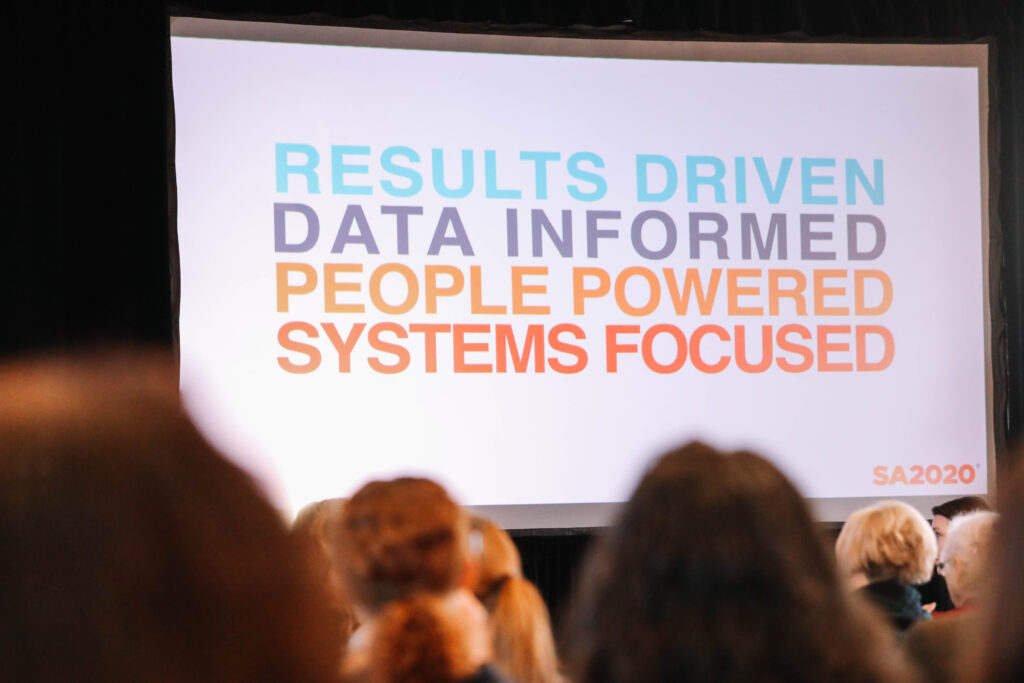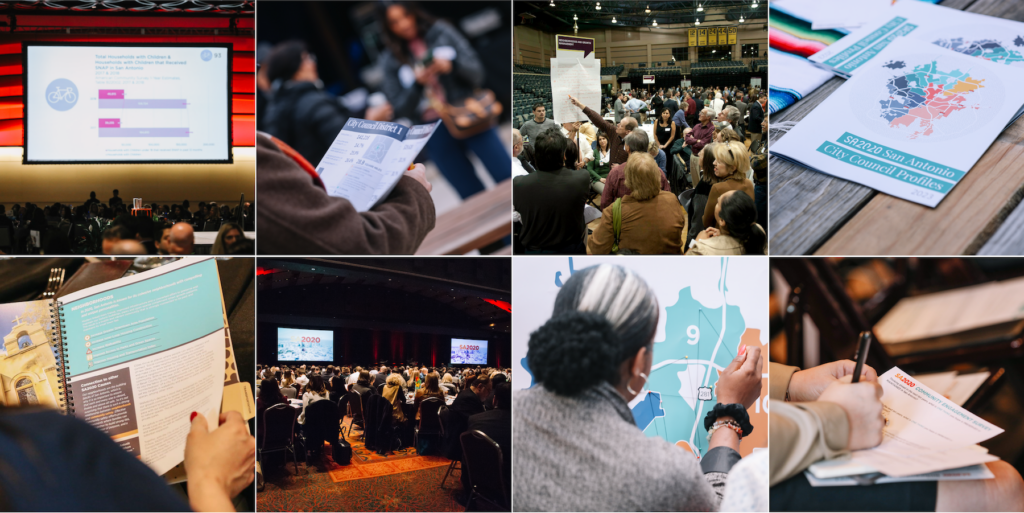SA2020 has long celebrated that we have a unique bird’s-eye view of San Antonio, given the community data we have released every year since 2012 and the valuable information more than 100 partner organizations share with us. Knowing that this vantage point is precious compels us to speak truth to power.
SA2020, the 501c3, is dissolving. The truth is we believe this is the most visionary thing we can do.
In 2021, SA2020 released a shared community vision for another decade of progress. This followed a yearlong community visioning process where nearly 12,300 San Antonians reaffirmed and strengthened nine community results and prioritized more than 50 community indicators by which to measure progress. This process included the buy-in of the City Manager and Mayor and Council, who praised SA2020’s work and called the shared vision “a roadmap for policy decisions.” Following this process, SA2020 received the American Civic Collaboration (“Civvys”) Award, the only national award dedicated to celebrating exemplary cases of collaboration and impact from which other cities can learn. SA2020 was nominated by Mayor Nirenberg.

Since then, SA2020’s research, storytelling, and racial equity practice has only improved.
Following the winter storms in February 2021, we released a Guide to Strengthening Relief, Response, and Recovery with a focus on prioritizing communities of color and low-income communities. For two years, we reported on COVID health data and tracked national, state, and local milestones. Last year’s annual data release included City Council Profiles, disaggregating data by the redistricted Council boundaries and, for the first time, overlaying the data with historical red-lining maps. Between 2021 – 2023, we hosted more than 19,000 users on our one-stop voting resource, and trained more than 400 people, including nonprofit board members, on the foundations of advancing racial equity.
SA2020’s work has been profiled nationally by the Brookings Institution and the American Institutes of Research, and internationally by the United Kingdom’s Industrial Strategy Council.
Most of all, we’ve strengthened our accountability of institutions to advance policies for racial equity and used our reach to amplify the biggest threats to community progress. When the City of San Antonio used a community survey about police accountability to justify an increase in the San Antonio Police Department’s budget, we brought attention to their lack of integrity in the collection, analysis, and reporting of data. We advocated for a broader understanding of community safety and police accountability by supporting Proposition B (2021) and Proposition A (2023), and made a case for how the latter would support an already successful workforce development program for people affected by the justice system. Most recently we made a statement on Palestine, upholding the calls for global connection and collective well-being embodied in the shared vision, and called on City Council to issue a ceasefire resolution for Gaza.
While this advocacy engaged more people in SA2020’s work and the shared community vision, it infuriated local institutions.
Last year, the City of San Antonio defunded SA2020, publicly devalued our work, and began planning a new community visioning process controlled by City Hall. The Express-News and San Antonio Report published pieces about the need for community visioning and shared goals, while neglecting SA2020’s work since 2020 or the reaffirmed and strengthened community vision for the year 2030. Local plans in education and economic development, backed by million-dollar investments, claim that SA2020 helped inform their strategies, yet their goals for post-secondary credentials and entrepreneurship are less ambitious or misaligned with the shared goals co-created by thousands of San Antonians. In the wake of our statement on Palestine, local funders withheld payment on existing grant contracts, threatened our 501c3 status, sought to control our public communications, and pressured us to remain silent. Twenty percent of our nonprofit partners withdrew their partnership with SA2020, many citing a desire to remain “politically neutral.”
We understand these responses as backlash to our strengthened ability and commitment to drive progress toward a better future by advocating for racial equity. Together, these actions by local institutions keep SA2020 from fulfilling its mission and sustaining its work, neglect the shared community vision that thousands of San Antonians have envisioned together, and hold back San Antonio’s progress.

This is why dissolving is the most visionary thing we can do. We refuse to be silenced or to skirt our organizational values of leadership, community, and accountability to secure funding or “a seat at the table” where decisions are made. That would be a disservice to the shared community vision.
It’s unusual for a nonprofit to dissolve with such intentionality and transparency. This is an example of practicing our values. Our decision to dissolve—just like our successes—reflect the cumulative lessons learned from more than a decade of work. Driving progress requires holding institutions accountable, and these institutions—including local government and local funders—must shift their policies, programs, and budgets to align toward shared goals. When this has worked well, we have seen the promise of real impact on people’s lives, from Pre-K 4 SA in 2012 to the first-ever bond election that prioritized housing affordability in 2022.
People have always been more visionary than institutions, and the most meaningful community visioning processes can only be led and owned by people. More than a decade ago, this insight was clear to then-mayor Julián Castro. This is why SA2020 was taken out of City Hall and made an independent nonprofit. SA2020’s legacy includes existing across the tenure of three mayors and two City Managers. In recent years, too many of our elected leaders, funders, and corporate executives have shown that they prefer a shared community vision for its talking points, rather than a practice that involves honestly examining the impact of their policy-making and philanthropy.
To claim that nonprofits can or should be politically neutral is dishonest. SA2020’s work, like all nonprofits, has always been inherently political. The nonprofit sector was created to fill the gaps in critical public health and human services—and SA2020 has always sought to amplify the critical role these organizations play in reaching shared community goals. From delivering services to advocating for policies to receiving government grants, nonprofits must engage in political work in order to effectively serve people. Even IRS laws that govern nonprofits’ tax-exempt status include parameters for how exactly nonprofits are allowed to engage in “political activity.”

We believe SA2020’s track record of excellence and integrity is the benchmark by which future community visioning will be measured. We expect bad faith players to use SA2020’s dissolution to direct attention to their own political agendas and claims to leading visionary work. We trust that San Antonio’s many visionary leaders—people who know that progress locally is tied to the liberation and freedom of people everywhere—will continue to imagine and help realize a better future.
SA2020’s annual data release is now live, accompanied by our final call to action—a policy agenda for the City of San Antonio based on the newest community data and our unique bird’s-eye view of San Antonio’s progress and challenges. These resources, along with the last twelve years of research and stories, will remain available at SA2020.org through September 2024.

